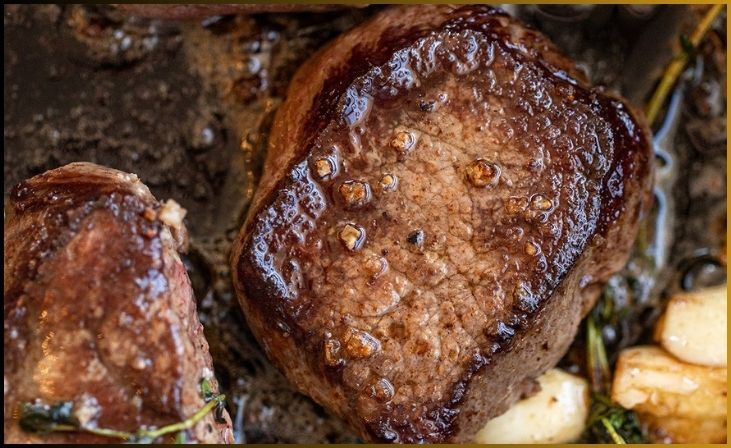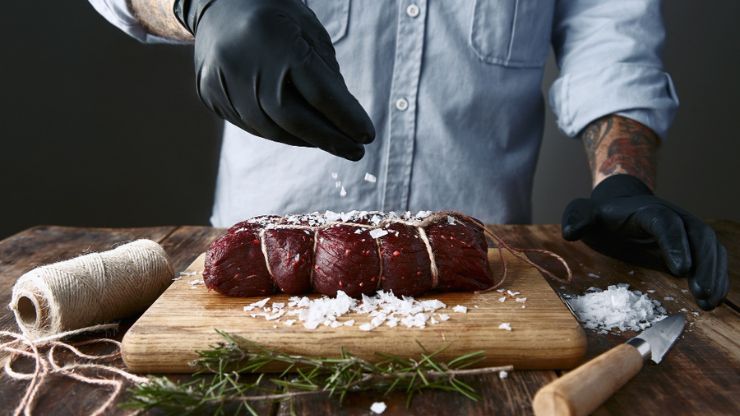Sometimes I’m amazed at the flavor of food someone else has cooked. I’m convinced the difference is in the little things—the secret touches that they don’t think twice about. Like marinating meat. Just this one simple step takes an otherwise unpalatable piece of meat and makes it tender and succulent. And by diverting your attention from the usual oil and vinegar mixture, and marinating meat with ferments, you create flavors you never imagined.
The basic ingredients of a marinade include an acid, such as vinegar or lemon juice, to help break down the proteins in the meat and make the meat more tender; an oil to add richness and coat the meat before cooking; and salt and seasonings for flavor.
Many cultures have used the enzymatic activity and probiotic nature of ferments to marinate their meat for centuries. Only in the past century have scientists discovered why these fermented marinades are so successful at tenderizing a tough cut of meat, leaving it succulent and flavorful.
As with most foods, fermentation helps pre-digest the meat to make its nutrients more bio-available, but it can also have other benefits. A. Price Foundation notes that eating pork causes chemical changes in the blood that can result in fatigue, but pork that has undergone lacto-fermentation in traditional curing practices, or through marination, avoids these pitfalls.
While salt curing a whole ham may be a bit more than you want to take on in the kitchen, a quick probiotic marinade with any one of these ferments can give you many of the same results without a hefty time investment.
Table of Contents
ToggleMarinating Meat with Ferments
Fermented marinades go beyond the conventional use of spices and acids; they introduce live cultures and beneficial bacteria into the mix. As these microorganisms work their magic, they break down proteins, making the meat more tender and easier to digest. The result is a marriage of complex flavors and improved culinary experiences. But it doesn’t stop there. Fermented marinades can also extend the shelf life of your meats, reducing the need for synthetic preservatives.
Marinating Meat with Yogurt
A traditional marinade in Indian cooking, yogurt contains enzymes that help to tenderize meat. This fermented dairy-based marinade breaks down collagen in the muscle tissue, creating small pockets for moisture and flavor to be drawn in. The result is tender, moist, and flavorful meat. As an added bonus, yogurt-marinated meat takes about 1/3 less time to cook.
Marinating Meat with Buttermilk

Southern fried chicken is traditionally marinated overnight in buttermilk and spices before coating it in flour and frying. The remaining moisture in the buttermilk after the marinade has been drained helps the flour stick to the chicken, and results in a crispy outer coating. Some recipes recommend pulling the chicken out of the marinade, dipping it in flour, and then dipping it back in the marinade and re-dipping it in flour for an extra crispy texture.
Marinating Meat with Raw Vinegar
Though vinegar is in a lot of marinade recipes, making a conscious choice to use raw vinegar will mean that the marination time is tenderizing the meat with more than just the power of acid. The additional probiotic nature of raw vinegar means that the marinade is working double duty, tenderizing the meat with cultures as well.
Marinating Meat with Kombucha
When your homemade kombucha starts getting a bit “long in the tooth” and it’s past its prime drinking stage, it’s just right for use as a marinade. The extra acidic zip from the over fermentation which makes it less appealing to drink straight is actually ideal for use tenderizing and flavoring meats.
Don't just scroll, subscribe!
BuzzTrail's unique web-stories are the cure for boredom you've been waiting for.
Marinating Meat with Sauerkraut Juice
The combination of salt, acid, and natural enzymes in sauerkraut juice help to tenderize and flavor meat as a marinade. It’s especially tasty on pork, where the flavors in the kraut complement the pork and add complexity to the dish. Try marinating pork chops in sauerkraut juice, and then serving the chops with fresh sauerkraut so that you get both the flavor from the marinade and the probiotics from the raw kraut.
Steps to Marinate Meat with Ferments
Follow the instructions for marinating Meat with ferment
Preparing the Meat
Begin by choosing the preferred meat, ensuring it’s beef, chicken, pork, or any other selection you fancy. Trim and cut the meat into manageable portions, ensuring it’s thoroughly clean and pat it dry. Proper cleanliness and dryness aid in better absorption of the marinade, allowing the flavors to penetrate the meat more effectively. This step is crucial as it sets the foundation for the marination process, ensuring the meat is primed for absorbing the rich and savory essence of the fermented marinade.
Mixing the Marinade
Craft a delectable marinade by blending your chosen ferments with an array of complementary ingredients such as aromatic herbs, aromatic spices, and quality oils. This amalgamation serves as the secret sauce that will impart the meat with distinctive and irresistible flavors. The ferments, with their tangy and savory notes, will work harmoniously with the herbs and spices to create a complex taste profile. The addition of oil not only enhances the consistency of the marinade but also aids in the even distribution of flavors across the meat. This step is where creativity takes the reins – you can experiment with various ferments and seasonings to achieve a unique and personalized marinade that caters to your taste preferences.
Marinating
Next, take the prepared meat and transfer it to a suitable container or a convenient ziplock bag. Now, it’s time to work your marinating magic by pouring the flavorful marinade generously over the meat. The key here is to ensure that every inch of the meat is completely submerged in the aromatic concoction. This full immersion allows the marinade to work its wonders on the meat, infusing it with a symphony of flavors.
Once the meat is perfectly nestled in the marinade, cover the container or seal the ziplock bag securely. The next step is crucial for the development of the taste – let the marination process unfold in the welcoming coolness of your refrigerator. A few hours of marinating will do the trick, but for those seeking an even more profound and complex flavor, leaving it to marinate overnight is the ultimate choice. This extended marination period allows the meat to absorb the intricate blend of ferments, herbs, spices, and oils, resulting in a truly exquisite culinary experience.
Cooking
With the marination process complete, it’s time to transform your marinated meat into a delectable dish. You have the freedom to choose your preferred cooking method, whether it’s grilling, roasting, or pan-frying. Each method offers a unique culinary experience, so pick the one that suits your taste.
Whichever path you take, the outcome will be nothing short of spectacular. As the meat sizzles and cooks, the flavors developed during marination will come to life. The result is a piece of meat that’s not only perfectly cooked but also incredibly tender and juicy. Every bite will be a burst of complex and harmonious flavors, a testament to the art of marinating with ferments, herbs, spices, and oil. Your taste buds are in for a treat, and your guests will be thoroughly impressed with your culinary prowess.
Final Words
In conclusion, the world of fermented meat marinades is a realm of culinary wonder, where the fusion of flavors, tenderness, and natural preservation knows no bounds. This technique marries tradition with innovation, offering a fresh perspective on marinating meats. By introducing live cultures and beneficial bacteria into your marinades, you not only elevate the taste and texture of your meats but also unlock the benefits of improved digestibility and extended shelf life.
As you venture into the art of marinating meat with ferments, you’ll discover a universe of possibilities. From classic combinations to bold experiments, the versatility of this method allows you to craft dishes that tantalize the taste buds and leave a lasting impression. So, whether you’re preparing a family meal or hosting a special gathering, consider harnessing the magic of fermented meat marinades to create memorable culinary experiences that stand the test of time.
FAQs (Frequently Asked Questions)
1. What is the science behind fermented meat marinades?
1. What is the science behind fermented meat marinades?
Fermentation introduces beneficial bacteria that break down proteins and complex compounds in meat, enhancing tenderness and flavor. These bacteria also produce lactic acid, which acts as a natural preservative.
2. Are there specific meats that work best with fermented marinades?
2. Are there specific meats that work best with fermented marinades?
While various types of meat can be marinated with ferment, options like pork, chicken, and beef are popular choices. Experimentation is encouraged to find your personal favorites.
3. How long should I marinate meat with ferments for optimal results?
3. How long should I marinate meat with ferments for optimal results?
Marination times can vary, but overnight marination or several hours is generally sufficient to achieve flavorful and tender results. Adjust to your taste preferences.
4. Can I use store-bought ferments or should I make them from scratch?
4. Can I use store-bought ferments or should I make them from scratch?
You can use store-bought fermented products, but making ferments from scratch allows for customization and control over ingredients. Both options can yield delicious results, so it’s a matter of personal preference.

